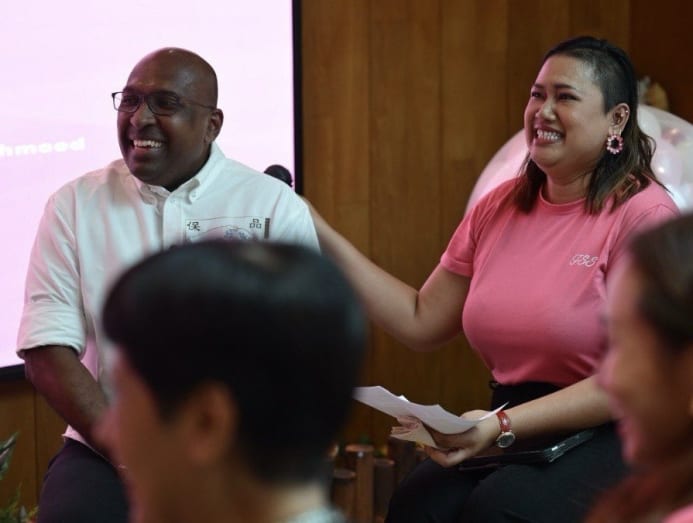Struggling to get pregnant: How husbands cope with IVF, miscarriages and disappointment
Infertility in Singapore affects 15 per cent of couples. The physical stresses and emotional demands of trying to conceive affects both the woman and man in the marriage. CNA Women gets an inside look from men who have been on this fertility journey.

Minister Indranee Rajah with couples who shared their fertility journey at Fertility Support SG’s Voices for Hope event on June 29, 2024. (Photo: Fertility Support SG)

This audio is generated by an AI tool.
Infertility is one of biggest hurdles couples trying to get pregnant face. In Singapore, one in six couples suffers from infertility, defined as having no success after trying to conceive naturally for up to 12 months.
Since 2020, Fertility Support SG (FSS) has provided a community for those facing infertility. The organisation, which is a non-profit Institution of Public Character, was started by women who suffered from fertility challenges themselves.
FSS is run entirely by volunteers who share content, offer support and provide a community on social media. They also hold talks and forums with medical professionals covering all areas of fertility, from understanding the conditions in women and men, procedures available and even weighing the costs of public versus private hospitals.
An FSS event in June, Voices of Hope, featured four couples and their fertility journey. CNA Women learnt how the stress of trying to get pregnant affects the men.
“I WAS SO HELPLESS BECAUSE I COULDN’T CARRY ANY OF THAT LOAD”
Lucius Young, 40, business owner

Lucius Young, 40, and his wife, Cheryl Goh, 39, experienced their first miscarriage in 2019 and discovered that Cheryl had 21 fibroids weighing almost 1kg, which were subsequently removed.
Since 2021, the couple has undergone two retrievals and four embryo transfers, all unsuccessful. In April 2023, Goh, a radio producer, had surgery on her left fallopian tube and recently in July, a four-hour surgery to remove both fallopian tubes.
Coping with infertility: “I’ve always solved problems either through hard work or planning. I haven’t been in a situation like this, where even if you took the best steps, and tried to weigh the dice, the end result could not even be predicted.
Seeing her go through the treatments and surgeries, it made me realise that she was on that physical and emotional rollercoaster. I was so helpless because I couldn’t carry any of that load. All I can do is to be supportive to her and her feelings.
Besides confiding in Cheryl, I don’t actively speak about it. The strength and courage I see Cheryl mustering at every tough moment is a constant reminder of the strength and independence that I fell in love with 17 years ago.
I’m fairly optimistic and I still remain hopeful at every point in our journey. We recently had a successful surgery lasting four hours and once our ob-gyn gives us the green light, we’ll roll the IVF dice again.”
Tips for couples:
- Identify a doctor you can trust and have honest discussions with.
- We set boundaries and do not engage with “helpful” family and friends who may say hurtful things.
- Give yourself space but also look to moving forward – we don’t stay sad for long if there’s been a setback.
COMMON FERTILITY SOLUTIONS
Couples who need help with conceiving can turn to assisted reproductive technology (ART), such as intrauterine insemination (IUI) and in-vitro fertilisation (IVF).
In IUI, sperm is injected into the uterus to help with conception. IVF is more invasive and is a multi-step process that requires egg stimulation, egg retrieval, insemination and fertilisation in a laboratory before the transfer of the embryo into the womb.
Although tedious, IVF has a higher success rate than IUI but also costs 10 times more.
The number of ART procedures has increased in Singapore with over 10,500 cycles done in 2022, compared with 8,700 cycles done in 2019, according to Ministry of Health figures.
Even with the increase, success rates vary from person to person – studies show the slimmest success rates (6.4 per cent) are for couples aged 40 and up.
“KNOWING THAT SOMETHING WAS WRONG WITH ME WAS A HUGE SHOCK”
Adrian Ang, 37, co-founder of Hepmil Media Group and SGAG

In 2018, after three years of marriage, Adrian Ang and his wife Goh Xin Lei started trying for a baby. They did IUI in 2019 and had two unsuccessful attempts. It was through this procedure that Ang found out that he had male infertility – his sperm had poor morphology and low motility.
They later started IVF, doing two embryo transfers but suffered a miscarriage. They also did another IUI procedure and a third embryo transfer, which were unsuccessful.
While taking a six-month break from fertility treatments, the couple conceived naturally and in July 2022, their son Zachary was born.
Coping with infertility: “Knowing that there was something wrong with me, affecting my fertility, came as a huge shock. I felt shocked and alone. Barely any men out there talk about their own issues, let alone fertility issues.
The different procedures were an emotional rollercoaster – even for me. With each one, it was like having hope but being disappointed time and again.
But I kept telling myself that I must be strong for my wife, who is the one physically putting herself through this entire process of fertility treatment.
When I started opening up, I was surprised that there were many other men who were going through the same thing. Many are suffering in silence, by themselves.”
Tips for couples:
- Opening up to close friends, family and even colleagues will help you build a stronger support system.
- It is hard but don’t lose faith. Low possibility doesn’t mean no possibility.
“IVF PLACES A HEAVIER BURDEN ON THE WOMAN AND HUSBANDS MUST STEP UP”
Mimrah Mahmood, 41, regional VP of sales

Mimrah Mahmood and his wife, Rafidah Jalil, an events director and business owner, found out that Mimrah had low sperm count. Their fertility specialist recommended IVF, and they got pregnant with their son on their first IVF cycle, in 2017.
However, their later attempts to conceive a second child via IVF were unsuccessful. It was on their fourth cycle that they welcomed twins, a boy and a girl, in 2020.
Coping with infertility: “When I found out about my low sperm count, I was shocked at first but relieved as it gave us a way forward.
I have a background in science so instead of getting caught up in emotions, I concentrated on finding solutions and [looking at the] different steps needed for IVF.
It was overwhelming and emotionally challenging for my wife. She needed more time to process all the information but we worked together and broke it down into manageable steps. IVF places a heavier burden on the woman and husbands must step up.
This journey has taught us the importance of flexibility and the value of a strong support system. We learned to celebrate the little victories and support each other during tough times.”
Tips for couples:
- Stay organised and stick to your doctor’s plan because the process is complex and timing is crucial.
- Remember you are not alone – talking to others who have been through IVF makes the process less daunting and even relatable.
“THERE IS ONLY SO MUCH A MAN CAN DO BUT TO LET GRIEF RUN ITS COURSE”
Winston Yip, 40, works in IT

Winston Yip, 40, and his wife, Josephine, got married 15 years ago at 26. A few years into marriage, she was diagnosed with polycystic ovary syndrome, which caused irregular ovulation.
The couple started fertility treatments in 2013, progressing from IUI to IVF. Despite multiple attempts and two miscarriages, they continued trying, even after discovering Josephine had uterine polyps, which required surgery.
In 2020, COVID-19 delayed their plans, but they managed a fifth IVF attempt, which ended in another miscarriage. In 2021, Yip’s wife found out she had breast cancer and underwent surgery and chemotherapy.
After completing treatment in 2022, she was cleared for IVF again. The couple is now awaiting viability scans for their remaining frozen embryos.
Coping with infertility: “We were hit badly by our last two miscarriages. I felt sad with each miscarriage but I was more concerned about Josephine’s feelings. I would check in with her – listen to her and let her cry. There is only so much a man can do but to let grief run its course and let time heal.
When we found out that Josephine had cancer in March 2021, I did not have much time to process it. Things were happening so fast, from getting diagnosed, to a treatment plan and mastectomy within two months.
The turning point was after the surgery when the doctor called me to say the operation went well. I broke down – it dawned on me, I could have lost her.
During those tough periods, we held on to our Christian faith, the support of our family and friends, especially those from FSS. I would also confide in a close buddy of mine.”
Tips for couples:
- Like any road trip or a long hike, it is normal to get tired or feel unwell. It is okay to have a pit-stop, but we should always look out for each other, recharge and set off together again.
- It is never about the destination, but always about our whys. Ours is because we are each other’s best friend and enjoy doing things together.
FERTILITY SUPPORT IN SINGAPORE
Support for your fertility journey: Fertility Support SG
Information about fertility: Healthhub
Information about co-funding for ART: Made for Families, a government initiative to support Singapore families.
Hospital fertility centres: SGH Centre for Assisted Reproduction (CARE), KKIVF Centre and NUH Centre for Human Reproduction
CNA Women is a section on CNA Lifestyle that seeks to inform, empower and inspire the modern woman. If you have women-related news, issues and ideas to share with us, email CNAWomen [at] mediacorp.com.sg (CNAWomen[at]mediacorp[dot]com[dot]sg).






